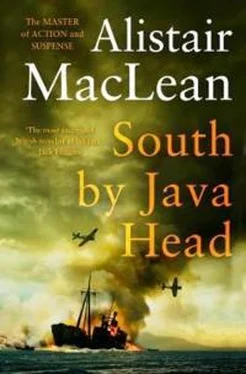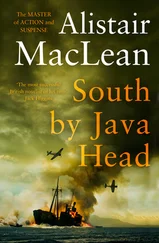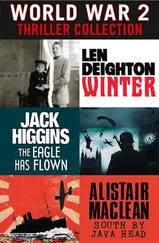There were twenty people in the boat. There had been twenty-two when they had set sail from that little island in the South China Sea six days ago, but only twenty now. Two had died. There never had been any hope for Corporal Fraser, he had already been weakened and ravaged with fever long before the cannon shell from the Zero had all but blown his left arm off as he had fought back at it with his puny rifle from the wheelhouse top of the Viroma . There had been no medical supplies, no anaesthetics at all left, but he had hung on for a lifetime of four days and had died only forty-eight hours ago, cheerfully and in great agony, his arm blackened right to the shoulder. Captain Findhorn had said as much of the burial service as he could remember, almost his last conscious act before he had fallen into the restless, muttering coma from which it seemed unlikely that he would ever emerge.
The other man, one of Siran’s three remaining crew members, had died the previous afternoon. He had died violently and because he had completely misinterpreted McKinnon’s slow smile and soft Highland voice. Shortly after Fraser’s death, McKinnon, whom Nicolson had made responsible for the water supplies, had discovered that one of the tanks had been damaged during the previous night, probably broached, but it was impossible to say: in any event it was empty, and they were left with less than three gallons in the remaining tank.
Nicolson had at once suggested that each person in the boat should be limited to one and a half ounces of water twice a day, taken from the graduated drinking cup – part of every lifeboat’s standard equipment: all except the little boy – he was to have as much as he wanted. There had been only one or two murmurs of dissent, but Nicolson had ignored them completely. The following day when McKinnon had handed Miss Drachmann the child’s third drink of the afternoon, two of Siran’s men had made their way down the boat from their place in the bows, armed with a heavy metal crutch apiece. McKinnon had glanced quickly at Nicolson, seen that he was asleep – he had kept guard almost all the previous night – and quietly asked them to get back, the revolver in his hand backing up his suggestion. One man had hesitated, but the other had flung himself forward, snarling like an animal, the crutch sweeping down in a vicious arc that would have crushed the bo’sun’s skull like a rotten melon if it had landed, but McKinnon had flung himself to one side even as his finger had squeezed down on the trigger and the man’s own impetus carried him headlong over the stern.
He was dead before he hit the water. Then McKinnon had wordlessly lined up the Colt on the other man, but the gesture was unnecessary; the man was staring down at the thin blue smoke still wisping from the barrel of the gun, and his face was contorted with fear. He turned quickly and stumbled back to his seat in the bows. After that there had been no more trouble about the water.
At the beginning, six days ago, there had been no trouble at all. Morale had been high, hopes higher, and even Siran, still suffering from the after-effects of concussion, had been as co-operative as possible and seen to it that his men were the same: Siran was nobody’s fool and realised as clearly as any that their survival depended upon common and combined effort: an alliance of expediency, it would last just as long as it suited him.
They had left thirty-six hours after the submarine, twenty-four hours after the last reconnaissance ’plane had passed over the tiny island and failed to find any sign of life. They had sailed at sunset, in a light following swell and the monsoon blowing steadily from the north. All night long and nearly all of the following day they had run free before the wind, and all this time the skies had remained empty and the only boat they had seen had been a prahu , lying far to the east. In the evening, with the eastern tip of Banka Island just lifting over the red and gold horizon to the west, they had seen a submarine surface not two miles away, then move away steadily to the north. Perhaps it had seen them, perhaps not – the lifeboat might have been lost against the darkening sea and sky to the east and Nicolson had dropped the tell-tale orange sails – the lug stamped with the even more damning “VA” – as soon as the submarine had broken water: either way it showed no suspicion, and was lost to sight before the sun had gone down.
That night they had gone through the Macclesfield Channel. This, they had thought, would be the most dangerous and difficult part of all, and had the wind dropped or backed or veered a few points either way they would have been lost, and found in clear sight of land when morning came. But the trades had held steadily from the north, they had left Liat on the port hand shortly after midnight and cleared the island of Lepar long before sunrise. It was just on noon of that same day that their luck finally ran out.
The wind had dropped then, suddenly and completely, and all day long they lay becalmed, not more than twenty-five miles from Lepar Island. Late in the afternoon a slow, lumbering seaplane – it might have been the same one as they had seen previously – appeared out of the west, circled overhead for almost an hour, then moved off without making any attempt to molest them. The sun was just sinking and a faint breeze beginning to spring up, again from the north, when another aeroplane appeared, again out of the west, flying about three thousand feet and straight at them. No seaplane this, but a Zero, and in no mood for either preliminaries or time-wasting. Less than a mile away it had dropped its nose and come screaming down out of the sky, twin cannon at its wing roots stabbing daggers of red in the gathering dusk, cannon-shells stitching parallel patterns of splashes and spouting spray across the placid surface of the sea right up to the centre of the helplessly waiting lifeboat, through it and away beyond.
Or perhaps not so helpless – not while the Brigadier held the machine-carbine in his hands, for the Zero swung round in a tight turn and headed off back against towards the west in the direction of Sumatra, its sleek fuselage black-streaked with pouring engine oil: less than two miles away it met the seaplane returning, and the two planes disappeared together into the pale golden afterwash of sunset.
The boat had been holed, severely, in two places but, remarkably, only one person hurt – Van Effen’s thigh had been badly gashed by a jagged splinter of shrapnel.
Not an hour afterwards the wind had started gusting up to force six or seven, and the sudden tropical storm was upon them almost before they had realised what was coming. It lasted for ten hours, ten interminable hours of wind and darkness and rain strangely cold, then interminable hours of yawing and pitching while the exhausted boat’s company baled for their lives all night long as pooping seas swept over the sternsheets and swirled over the sides and water gushed continuously through the jury patches in the bottom of the lifeboat – the supply of wooden plugs in the repair outfit hadn’t gone very far. Nicolson sailed south before the storm with the jib down and the lug sail reefed until he had steerage way and just no more. Every mile south was a mile nearer the Sunda Strait, but he could have done nothing else than let the storm drive him along even if he had wished to: holed by the stern and deep down by the stern, a sea anchor streamed aft would have pulled them under, and it was quite impossible to heave to with a bow anchor out: enough speed, enough steerage way to get them round would have meant enough sail to dismast the boat or capsize her on the turn, and without that steerage way the sluggish, waterlogged boat would have broached to and been driven under in the troughs. The long agony of the night had ended as abruptly as it had begun, and it was then that the real agony had started.
Читать дальше
Конец ознакомительного отрывка
Купить книгу










